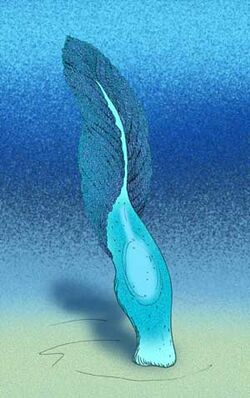Biology:Stromatoveris
From HandWiki
Short description: Extinct genus of invertebrates
| Stromatoveris | |
|---|---|

| |
| Artist reconstruction | |
| Scientific classification | |
| Domain: | Eukaryota |
| Kingdom: | Animalia |
| Phylum: | Ctenophora |
| Genus: | †Stromatoveris Shu et al. 2006 |
| Species: | †S. psygmoglena
|
| Binomial name | |
| †Stromatoveris psygmoglena Shu et al. 2006
| |
Stromatoveris psygmoglena is a genus of basal petalonam from the Chengjiang deposits of Yunnan that was originally aligned with the fossil Charnia (strictly, the Charniomorpha) from the Ediacara biota.[1] However, such an affinity is developmentally implausible and S. psygmoglena is now thought to be either a sessile basal ctenophore, or a sessile organism closely related to ctenophores.[2] Nevertheless, a 2018 phylogenetic analysis by Jennifer Hoyal Cuthill and Jian Han indicated that Stromatoveris was a member of Animalia and closely related to ediacaran frond-like lifeforms.[3][4]
Distribution
References
- ↑ Shu, D. -G.; Morris, S.; Han, J.; Li, Y.; Zhang, X.; Hua, H.; Zhang, Z.; Liu, J. et al. (2006). "Lower Cambrian Vendobionts from China and Early Diploblast Evolution". Science 312 (5774): 731–734. doi:10.1126/science.1124565. PMID 16675697. Bibcode: 2006Sci...312..731S.
- ↑ Antcliffe, J. B.; Brasier, M. D. (2007). "Charnia and sea pens are poles apart". Journal of the Geological Society 164 (1): 49–51. doi:10.1144/0016-76492006-080. Bibcode: 2007JGSoc.164...49A. https://oxford.academia.edu/MartinBrasier/Papers/416927/Charnia_and_Sea_Pens_Are_Poles_Apart.
- ↑ Hoyal Cuthill, Jennifer H.; Han, Jian (2018). "Cambrian petalonamid Stromatoveris phylogenetically links Ediacaran biota to later animals". Palaeontology 61 (6): 813–823. doi:10.1111/pala.12393. http://eprints.esc.cam.ac.uk/4315/1/Cuthill_et_al-2018-Palaeontology.pdf.
- ↑ Hoyal Cuthill, Jennifer (10 August 2018). "Scientists take a closer look at Earth's first animals". Phys.org. https://phys.org/news/2018-08-evolution-rethink-scientists-closer-earth.html.
- ↑ The paleobiology database
Wikidata ☰ {{{from}}} entry
 |

